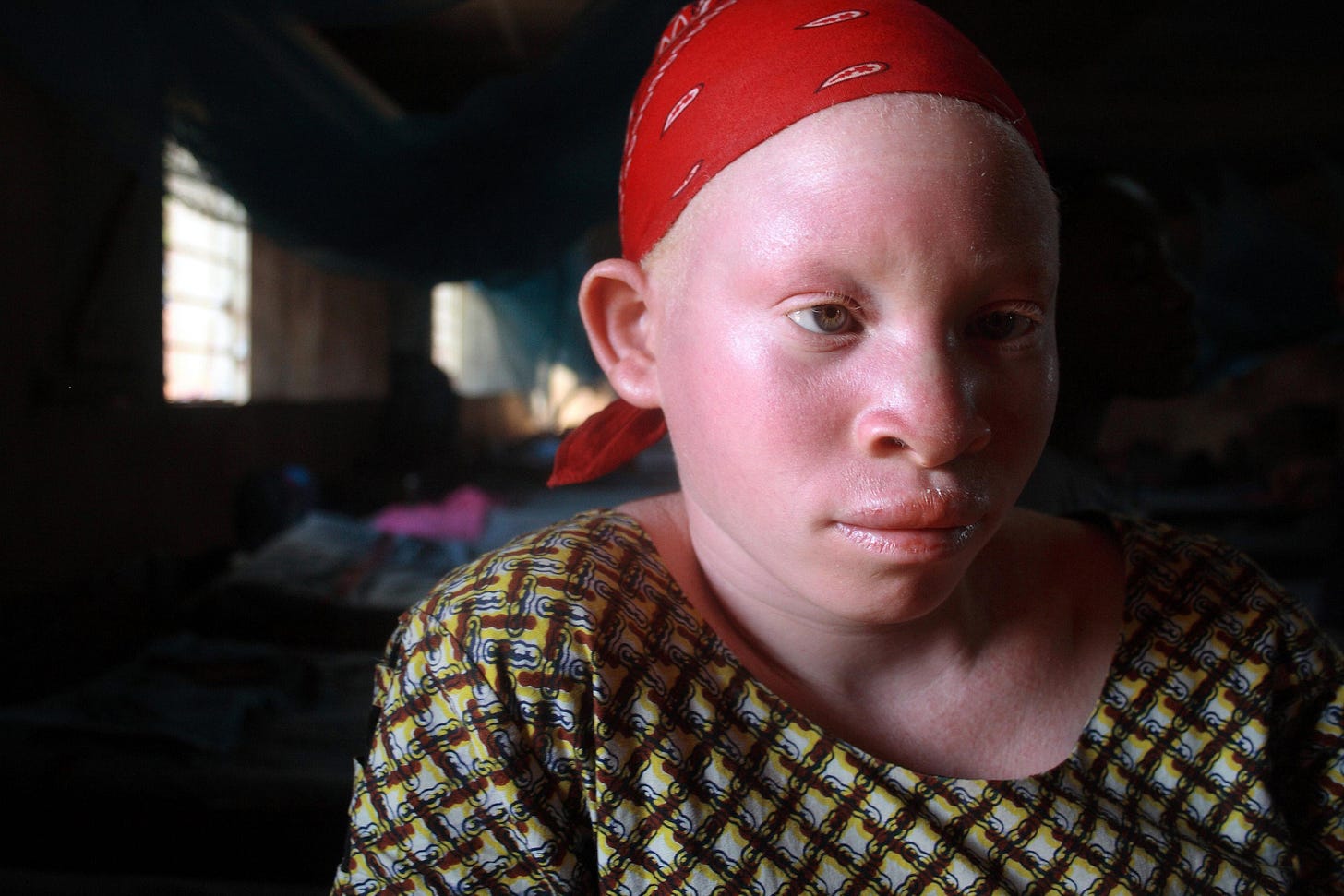Adama (not her real name) says she is not always in the mood to talk about her condition, but she is willing to speak to journalists who can share her story to help inspire other women living with albinism.
The 25-year-old says she is not expecting her husband to return. He left her over a year ago when a skin growth appeared on her face one day and got larger. The growth spread, covering nearly the entire right cheek, pushing down on her lips and the corner of her eye.
Adama early last year left her home in Moyamba, Southern Sierra Leone to seek medical attention. She now lives at Grafton a community in the Western Rural Area of Freetown, Sierra Leone's capital, she is diagnosed with cancer.
Speaking during a whatsapp video call her voice is barely above a whisper. She wrapped her face almost completely to hide the protruding bulge on the right side of her face.
She says she neither knows where she will get the money to pay for her medical needs, nor does she think she will ever see her husband again. Adama’s story is similar to many women living with albinism.
Albinism is a rare, non-contagious, genetically inherited defect that presents from birth. In almost all types of albinism, both parents must carry the gene for it to be passed on, even if they do not have albinism themselves. The condition is found in both sexes regardless of ethnicity and in all countries of the world. Albinism results from a lack of pigmentation (the black melanin) in the hair, skin and eyes, causing vulnerability to the sun and bright light.
Due to the plethora of challenges persons with albinism are faced with and the emerging global advocacy for their protection, the United Nations Human Rights Council adopted a resolution in 2013 (A/HRC/RES/23/13) calling for the prevention of attacks and discrimination against persons with albinism around the world.
Muluka-Anne Miti-Drummond is an independent expert on albinism, she said in line with her job she received disturbing reports of attacks and abductions of persons with albinism, in two different countries, both of which had little or no known attacks against persons with albinism until quite recently.
“One of the victims was a child whose body was reportedly thrown into a river after her eyes and organs had been removed, no doubt for ritual purposes.”
Miti-Drummond was speaking at the Human Rights Council in Geneva where she presented her first report since her appointment as UN Independent Expert on the enjoyment of human rights by persons with albinism.
Sierra Leone is home to a significant number of persons with albinism relative to the country’s population and reported average frequency in the Sub-Saharan Africa region. Persons with albinism in Sierra Leone are victims of marginalization, discrimination and stigmatization which makes them vulnerable to violent attacks.
Rashid Dumbuya is Executive Director for Legal Link, every year as the world celebrates the International Day of Persons with Albinism, the non-profit legal advocacy group joins the Sierra Leone Association for Persons with Albinism to call on the government to increase medical and educational support to persons with Albinism in the country.
Mohamed K Sesay is Programme Officer of the Sierra Leone Albinism Foundation (SLAFo) he says they face several health challenges including skin cancer due to a lack of specialists in dermatology and the growing rate of poverty across the country.
Health care for Albinos and other persons with disability in Sierra Leone is supposed to be free according to the Disability Act, this is however not visible in practice Sesay claims. “The Disability Act clearly states that healthcare for albinos and other disabled persons is free of cost, but the reality is far from that,” Sesay says.
Ramatu, is a petty trader at Jui Junction in Freetown she could be spotted a few metres from the Total Petrol Station at Jui, she mostly sells fresh bread, speaking in an exclusive interview with this writer Ramatu said she is determined to not let the challenges of albinism hinder her. She revealed that she dropped out of school after attaining Junior Secondary School education due to the deterioration of her eyesight.
"I could not see the board in the classroom," she says.
In a light-hearted manner, she told me she was not married and says finding someone to love her has not been easy. She admits she does not know if she will ever find a man to love though she is just 26 years old.
Following the death of one of their members, Founder and Executive Director of Sierra Leone Association for Persons with Albinism, Mohamed Osman Kamara took to Facebook to lament the challenges they face.
“We demand action be taken now! we crying since last night... about the demise of Mahid Jalloh, who was also admitted at Connaught for skin cancer. He was transferred to The Shepherd Hospital at Tombo where he passed on. We are calling on the Sierra Leone Government, and all organizations around the world to help us. Skin cancer is killing us because we lack proper health care. this is a serious national issue. Every citizen should be concerned,” he wrote.
In 2021, the UN Human Rights Council adopted a resolution on the elimination of harmful practices related to accusations of witchcraft and ritual attacks, recognizing the need to combat that phenomenon.
This fellowship story is produced with funding from the Journalist for Human Rights (Jhr) in partnership with the Sierra Leone Association of Journalists (SLAJ).



